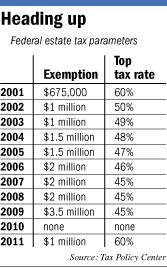Subscriber Benefit
As a subscriber you can listen to articles at work, in the car, or while you work out. Subscribe NowBenjamin Franklin said, “In this world, nothing can be said to be certain, except death and taxes.” But thanks
to congressional gridlock, the federal estate tax is currently as uncertain as levies get.
Under present law,
Uncle Sam gets to collect 45 percent of any inheritance above a $3.5 million exemption. But that law is scheduled to expire
at the end of the month. If Congress doesn’t act soon, there will be no federal estate tax at all in 2010. It would
return automatically in 2011, but with a mere $1 million exemption and 60-percent tax rate.
The curious situation
is a planning nightmare for small-business owners, many of whom hold the bulk of their wealth in their companies. Inheritance
experts prefer to tie up all the loose ends of an estate plan long in advance, so families can focus on grieving. The legal
limbo is likely to be an unnecessary frustration next year for many small companies that would rather concentrate on mourning
a cherished entrepreneur’s death.
Consider Jonathan Byrd II, vice president of Greenwood-based Byrd Enterprises.
He’s still sorting through the emotional aftermath of the Aug. 20 passing of his 57-year-old father, Jonathan Byrd.
The loss is also taking a huge toll on the company he left behind. Its main assets include Jonathan Byrd’s Cafeteria
in Greenwood and a chain of six hotels in Arizona and Utah. Byrd also owned more than a dozen race cars that competed in the
Indianapolis 500.
 Confusion over estate taxes has left Jonathan Byrd II’s Greenwood cafeteria business “at a standstill.”
Confusion over estate taxes has left Jonathan Byrd II’s Greenwood cafeteria business “at a standstill.”(IBJ Photo/Robin Jerstad)
Lawyers are still sorting out the elder Byrd’s estate and its tax bill. His son shudders
to think about the complications he’d be facing now, if his father had held on just a few more months.
“With his passing, we’re dealing with the tax implications,” Byrd said. “We have no idea. It’s
so complicated and so convoluted, we can’t make any decisions about hiring, firing, expansion, because there may be
this huge tax bill coming and we don’t know what it’s going to be.”
Byrd said his business
is “literally at a standstill,” uncertain whether it can afford to buy new equipment, replace worn carpets, or
sign contracts for television advertising packages.
His dilemma would be even worse if Byrd Enterprises faced
a 60-percent estate tax rate on everything over $1 million. Byrd doesn’t see how family owners will be able to afford
that kind of penalty and keep their companies intact.
“Small businesses won’t be able to pay those
kinds of things,” he said. “In this economy especially, when nobody is doing well, that type of punishment really
hurts the business, the small businesses which even the president says are the backbone of the country.”
How we got here
The current estate-tax schedule dates back to 2001, when President George W.
Bush attempted to permanently repeal it, but instead brokered a decade-long series of increasing annual exemptions and decreasing
rates (see table). According to the Washington, D.C.-based Tax Policy Center, about one in 460 deaths triggers a taxable estate.
Because Bush failed to secure a permanent repeal, the tax disappears for just one year. But no estate tax is not
necessarily any better for small businesses, pointed out attorney Rodney Retzner, who chairs the estate planning and administration
practice at local law firm Krieg DeVault LLP.
If Congress doesn’t act, estates in 2010 would instead be
subject to capital-gains taxes on the value of companies they hold, Retzner said. Let’s say Dad founded a small business
30 years ago on nothing but his own ambition. If that company were now worth $10 million and he died next year, his heirs
could be required to pay capital-gains taxes on the whole $10 million.

Between quirks like that and
the estate tax’s impact on the federal budget, the issue has become a political hot potato—one
Retzner and other experts predict Congress will simply pass, perhaps retroactively, if legislators miss
the Dec. 31 deadline. The U.S. House has agreed to an estate-tax extension for next year, but the legislation
has bogged down in the Senate. There are competing proposals on the table to potentially hike or cut
it.
“In all likelihood, what we expect is kicking the can down the road, with 2009
rates and exemptions for at least 2010, and then they’ll pick this back up again in 2010 and try
to figure where they should go,” Retzner said. “Or kick it again to 2011.”
Other experts agree.
They won’t believe the estate tax is truly going away until they see proof it’s gone.
“We’re
definitely taking the approach that there’s going to be some estate tax,” said Lorelei Tolson, a director of Carmel-based
Oxford Financial Group Ltd. who concentrates on estate planning. “We’re encouraging clients to continue with any
kind of gifting programs [which can shield estates from inheritance taxes] they’re doing.”
Hoping
to see the tax die
Some still hope to see the dreaded tax eliminated. Phil Terry, CEO of locally based
Monarch Beverage Co., sees it as fundamentally unfair, and an unnecessary drag on business.
“Taxes were
paid on the money earned during the life of the corporation,” he said. “So the wealth has already been taxed once,
when it was created. Now, just because of a death, we’re taxing it again. Then to [potentially] tax it at 50 percent
or more, that’s confiscatory. Plus, it makes planning very, very difficult.”
But there are many national
business leaders, including Bill Gates and Warren Buffet, who argue in favor of the estate tax as a fair debt the ultra-wealthy
owe to society for a lifetime of lucky breaks.
Whatever its exemptions and rates, most planners would be satisfied
if they could just prepare with certainty for an estate tax with firm parameters. Even when estate taxes are tough to swallow,
the federal government allows up to 15 years to pay them off, Retzner said.
When it comes to business preservation,
planning is the key, particularly for management succession, he said. Failure to identify a company’s key personnel
and set up incentives to retain them after an owner’s death is far more harmful than even an onerous estate-tax bill,
he said.
“The tax is definitely a bite, and will cause cash-flow problems, but it’s not the reason
most businesses will fail,” Retzner said.
“We tell people, ‘Let’s plan the best we can
to anticipate the tax rules and use the tools still out there now, before the government takes them away. But more important
than tax planning, let’s put a true succession plan in place.”•
Please enable JavaScript to view this content.
